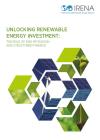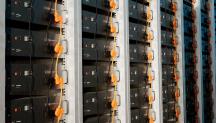

-
-
IRENA (2016), ‘Unlocking Renewable Energy Investment: The Role of Risk Mitigation and Structured Finance,’ IRENA, Abu Dhabi
Copied
/-/media/Files/IRENA/Agency/Publication/2016/IRENA_Risk_Mitigation_and_Structured_Finance_2016.pdf?rev=e0881387e1f0486184ceb2d380ceb359
Copied
Unlocking Renewable Energy Investment: The role of risk mitigation and structured finance
Newsletter
Scaling up renewable energy calls for mobilising a massive investment increase. Renewables bring far reaching benefits in terms of human health, energy access, environmental protection and the response to climate change, along with the potential to create new jobs around the world. Amid rapidly falling technology costs, meanwhile, renewable energy technologies have become increasingly cost-competitive with fossil fuels, even amid low global oil prices.
Yet global investment in renewables has remained far below its potential, as this report from the International Renewable Energy Agency (IRENA) explains. The investment shortfall reflects enduring market barriers and perceptions of high risk that deters private investors and financiers.
Unlocking Renewable Energy Investment: The role of risk mitigation and structured finance identifies the main risks and barriers limiting investment; it also supplies a toolkit for policy makers, public and private investors, and public finance institutions to scale up their investments in renewable energy.
Accompanying case studies and survey material provide insights on the challenges, the opportunities and what has actually worked in different markets. IRENA complied these real-world examples and conducted survey questionnaires through engagement with its member countries and industry stakeholders in both energy and finance.
The resulting report identifies five main action areas whereby policy makers and development financial institutions can address risks and barriers for renewable energy projects:
- Advance renewable energy projects from initiation to full investment maturity.
- Engage local financial institutions in renewable energy finance.
- Mitigate risks to attract private investors.
- Mobilise more capital market investment.
- Create facilities dedicated to scaling up renewable energy investment.
More broadly, the report can serve as a guide to the key financial market instruments for renewables. Greater familiarity with such instruments, particularly among policy makers, investors and financial institutions, should bring down the financing cost of renewable energy projects.
See also IRENA’s Sustainable Energy Marketplace, a tool to identify compatible projects, investors, finance sources and instruments, which can help take projects forward to full investment maturity.




